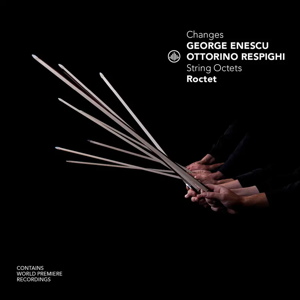
Changes
Ottorino Respighi (1879-1936)
Doppio Quartetto in D minor, P. 27 (1900)
Theo Loevendie (b. 1930)
Changes (2024)
George Enescu (1881-1955)
Octet for strings in C major (1900)
Roctet
rec. 2024, Muziekcentrum van de Omroep, Hilversum, The Netherlands
Reviewed as lossless download
Challenge Classics CC720001 [65]
I requested to review this mainly on the basis of the presence of a work by Respighi which I didn’t know. The front cover of the booklet states that the recording “contains World Premiere Recordings” but then doesn’t say which they are. Obviously the Loevendie is, having been written in the same year as the recording, but the Enescu definitely isn’t, so I can only assume this means the Respighi is. I can’t find any other recordings of it, so I’m surprised a little more fuss hasn’t been made of the first recording of a work by such a well-known composer. At least it explains why I didn’t know the work.
While Respighi titled this a Double Quartet, and the booklet notes list the members of two distinct quartets, there doesn’t seem to be an obvious division in sound between the two groups. Each movement is relatively brief (something that can’t be said for the Enescu), and leaves you wanting more. There is a considerable variation in styles across the four movements – a drama-filled opening, followed by a soulful Adagio, an almost-Mendelssohnian “scherzo” and finishing with an energetic Hungarian dance – but the transition from one to the next is skilfully handled, and everything is mightily enjoyable. It’s quite a discovery, and, if it is indeed a first recording, a feather in Roctet’s cap.
I’d not encountered the music of Dutch composer Theo Loevendie before, and after the Respighi, it was like lemon juice on a cut. My first impressions of the harsh dissonances and unpredictable rhythms were not promising, but when I returned to it (in isolation), I gained a better opinion. No, I’m not likely to listen to it very often, but I can appreciate its qualities.
Enescu was still a teenager when he wrote his Octet, and it is remarkably assured if flawed. There are very strong French influences, unsurprisingly as he had just finished studying in Paris when he wrote this, but they are shot through with a wilder streak, which could be the Romanian folk influence or simply the impetuosity of youth. At over thirty-seven minutes, with each movement clocking in at over eight minutes (give or take or a few seconds), it overstays its welcome somewhat. Drop in anywhere in the dreamy slow movement and you will find quite lovely music, but listen all the way from the start and at some point in the nine and a half minutes, I’m sure your attention will wander. Oddly, I had almost the exact opposite reaction to the final movement, which has a waltz rhythm. The whole is definitely more than the sum of its parts: small sections seem erratic, but over the eight minutes, there is a logic that develops quite brilliantly into an exciting climax. My personal jury is still out on this work, and indeed on Enescu in general.
Roctet is a Dutch ensemble, formed in 2016, and is a permanent string octet, unlike similar large chamber ensembles which draw from a pool of players to make up different groupings (the Nash Ensemble comes to mind). Given the limited number of works for this combination, theirs must be a hard road to hoe. Their sound is spare, with not much in the way of warming vibrato. That certainly suits the Loevendie, and to my surprise, it works with the Respighi, ensuring that there is not too much Romantic syrup, but a little extra warmth might have helped the Enescu. The booklet notes, though well-written, are somewhat unbalanced with the most space being given to the seven-minute Loevendie piece.
David Barker
Previous review: Nick Barnard (March 2025)
Buying this recording via a link below generates revenue for MWI, which helps the site remain free




















